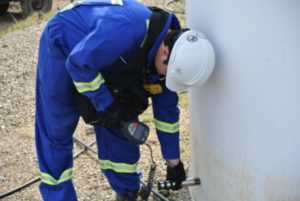 Purpose
Purpose
Subsurface reservoirs contain water, oil and gas in various percentages. The formation water can contain Barium, Strontium and Calcium and naturally occurring Radium or other radio nuclides. During exploration when injected with water, this results in a chemical incompatibility with the subsequent formation of a chemically inert and insoluble material commonly referred to as NORM (Naturally Occurring Radioactive Material) / LSA Scale (Low Specific Activity Scale). This material can be deposited in the form of scale, sand, wax and sludge. NORM may also be present in produced water, condensates and Radon gas, a radium daughter, may also be found in produced natural gas.
NORM is a 1 day program designed to provide a basic understanding of what is needed to work efficiently and safely while operating, maintaining or entering oil and gas production equipment that may contain Naturally Occurring Radioactive Material. The student is introduced to the subject through a discussion of the nature and effects of NORM. The monitoring of oil and gas production equipment for the presence of NORM and NORM quantitative measurement methods are discussed. Control and management techniques are reviewed and practiced.
Target Audience
Petroleum industry workers who are actively engaged with NORM (LSA Scale) -contaminated equipment and processes should take the NORM Safety Training course.
This hands-on workshop is designed for people who have to deal with Naturally Occurring Radioactive Materials in:
- Water and waste treatment facilities
- Sites which handle oil or gas drilling pipes
- Natural gas and propane processing facilities
- Sites which process uranium or radium ore
- Thorium processing sites
- Facilities that handle radium illuminated instruments and dials
- Radon in buildings
- Disposal and recycling facilities
This practical hands-on type of course will enable you to identify the presence and quantity of NORM, how to evaluate radiation conditions for worker safety, and how to safely handle or dispose of NORM.
Course Content
- Typical NORM & manmade radiation exposure
- Origin of NORM
- Where is NORM usually found in the oil and gas industry
- Radiation units
- Basic radiation concepts
- Radiation types and characteristics
- Identification of NORM hazards
- Radiation protection techniques
- Time, Distance and Shielding
- Contamination control and worker PPE
- Safe NORM work procedures
- Signs
- Practical plat turnaround procedures and practices
- NORM equipment control and TDG requirements
- NORM waste management
- NORM sample collection and analysis
- NORM instrumentation, detection and surveys
- Hands on NORM meter exercises
- Biological effects and occupational radiation exposure risks
NORM (LSA Scale) Training with hands on experience with industry’s most common NORM meters. You will get experience using the latest digital detectors, as well as more classic instruments you may already have. Feel free to bring your own detectors, we will show you how to use them as well during the class.
Additional course content for Radiation Protection Supervisors (RPS):
- Review of basic radiation safety
- Biological effects
- Radioactive Substances Act
- Dose limitation
- The regulation of work with radiation
- The role of radiation protection supervisors
- Advanced scientific calculations for radiological protection
- Principles and practices of radiation protection
- Radiation monitoring
- Transport of radioactive substances
- Personal dosimetry
- Emergency procedures
- The Ionizing Radiations Regulations
| Course | Fee INR | Duration | Course Timing | Date Commence | Remarks |
|---|---|---|---|---|---|
| NORM / LSA Scale Awareness | 20,000 | 1 day | 10:00-18:00 | On Demand | Practical Training |
| Radiation Protection Supervisor (RPS) | 30,000 | 2 days | 10:00-18:00 | On Demand | Practical Training |
